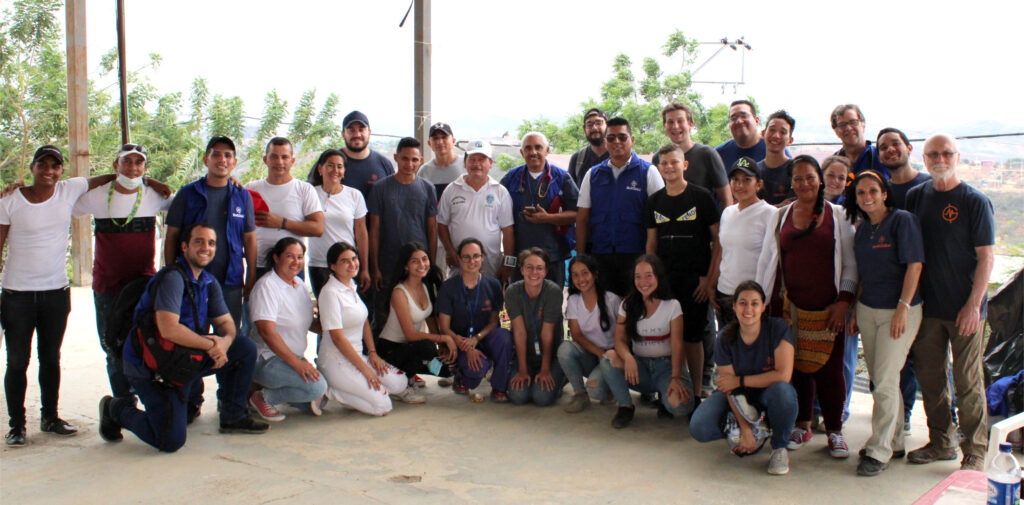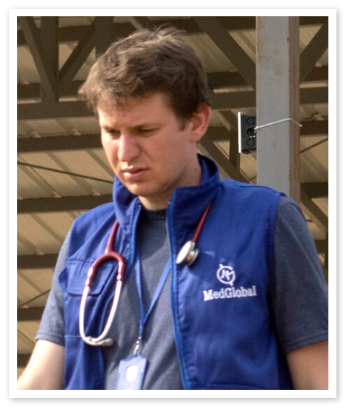Updates & Press
Uncategorized | June 13, 2020
Volunteer Spotlight: Meet Dr. Guillaume Mongeau-Ma
Author | MedGlobalComms

A seasoned volunteer, Dr. Guillaume Mongeau-Martin has worked with refugees at all three of MedGlobal’s sustainable program sites. He most recently returned from a Colombia Brigade mission that was cut short as borders closed due to COVID-19. We are proud to highlight Dr. Mongeau-Martin as a part of our diverse team making a difference all over the world!

Where are you located and what is your profession?
I am a Canadian family physician based in Calgary. My main focus is refugee health, and I work exclusively with newly arrived refugees at a specialized clinic. I also try to work abroad as often as I can, mainly with MedGlobal.
If you could witness any event of the past, present, or future, what would it be?
I was born and raised in Montreal where ice hockey is our religion. I would love to witness the last time our hockey team, the Montreal Canadiens, won the championship in 1993. I was only 2 years old at the time, and the way the franchise is doing now (they are terrible), I will probably be 82 the next time they win it all.
How would your friends describe you?
My friends would probably say I am the joker of the group. I like to think I can be pretty funny at times, but I am sure some people would disagree with this. This facet of my personality is actually quite useful in my line of work. Working in unpredictable environments such as refugee camps can often be stressful for a medical team, but I find a little humour usually helps lighten the mood and recharge everyone’s batteries.
Who inspired/inspires you, both professionally and personally?
At the risk of sounding cliché, I get most of my inspiration from my refugee patients. Some of them have life stories that could rival any Hollywood movie, and not in a good way. Their resilience is incredible, and despite all their hardships, they manage to carry on in life with remarkable composure.
I saw a new patient at my clinic the other day who had been imprisoned for years as a “political prisoner” in his country of origin. He was tortured regularly and suffered unspeakable abuse. He managed to escape, and after fleeing through several countries, he finally made it to safety in Canada where he was granted asylum. But even after going through all this, he was still smiling and even cracked a few jokes with me at the clinic. These stories put life into perspective, and I try to remember this when I feel like complaining about silly things like a slow internet connection or cold coffee.
What countries have you volunteered in?
In the last year, I have worked in 3 locations with MedGlobal: in Bangladesh with the Rohingya refugees, in Greece at the infamous Moria camp, and in Colombia with the Venezuelan migrants. I also treated Syrian refugees in Jordan with another NGO, and I work every year at a rural hospital in Benin where I teach and do capacity building with local partners.
Why do you volunteer?
While I do volunteer abroad to help people who need it the most, I think it is also important to remind people that you do not have to go abroad to make a difference. There are already plenty of people who need help in our own backyards!
Personally, I volunteer in places like refugee camps mainly because I embrace the challenge and enjoy the constant element of surprise. You never know what is going to walk through the door! I also developed a passion for tropical medicine over the years and I love tackling complex issues such as malaria or malnutrition.
What is your most memorable moment on a MedGlobal trip?
I have had a lot of memorable moments during my missions with MedGlobal, but one patient encounter really stands out. During our most recent medical brigade in Colombia, I witnessed an exorcism in the middle of the clinic!
A young teenage patient of mine was suffering of what we call “psychogenic nonepileptic seizures”. These episodes of loss of consciousness look like typical seizures but are actually not due to epileptic brain activity. They are instead usually caused by an underlying mental health disorder or past traumatic events.
My patient started having one of her episodes in front of me, and after a few minutes, she still had not regained consciousness. A local priest then came to me and said he could “bring her back.” Having no other option, I accepted his help. To my surprise, he then started performing an actual exorcism. After shouting a few lines from the Bible and imploring the demons to leave her body, the patient finally woke up and stood up as if nothing had happened.
I think this is a great example of “using local solutions for local problems,” which is an important rule of global health.
After volunteering, how has your perception of Global Health issues changed?
One thing I have realized during my medical missions is how important it is to understand and assume your role as a global health worker working in a foreign environment. I always try to ask myself what I can bring to the table based on my skills and available resources. If I cannot provide anything useful, then I do not even bother sitting at the table, because I might be stealing a spot from someone who could actually contribute.
This rule applies to individual healthcare workers like me, and even more so to humanitarian organizations. This is one of the reasons why I like MedGlobal’s approach to international aid: each mission is always done in partnership with a local organization that understands what the actual needs of the community are.
Thank you for being a part of the MedGlobal community, Dr. Mongeau-Martin!


